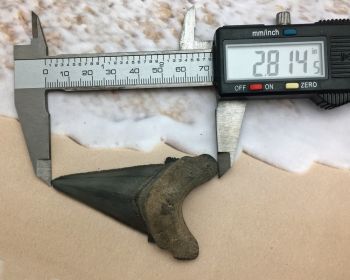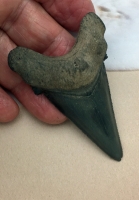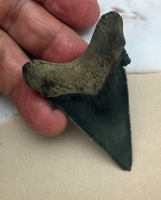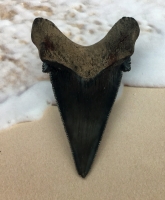
This is your opportunity to own an authentic fossil shark tooth. Imagine holding this tooth in your hand. Envision the power of the living animal that once had this tooth. Feel the serrated edges that cut through flesh and bone. Imagine the bone crushing force of its bite. Hold this tooth in your hand and know the terror its prey must have felt millions of years ago.
Sharks continually produce teeth throughout their entire lives. Depending on what they eat, sharks lose a set of teeth every one to two weeks, getting through up to 40,000 teeth in their lifetime. This means that shark teeth are continuously raining down onto the ocean floor, increasing the chance that they will get fossilized.
This tooth is Early Miocene to Pliocene 23 to 3.6 million years ago.
This tooth was collected by scuba divers off the east coast of the USA
The front and back of the tooth is shown in the photos.
CLICK PHOTOS TO ENLARGE IMAGES
Carcharocles auriculatus is an extinct species of large sharks in the genus Carcharocles of the family Otodontidae, closely related to the sharks of the genus Otodus, and also closely related to the later species Megalodon. Its teeth were large, having coarse serrations on the cutting edge, and also with two large cusplets. The teeth can reach up to 130 millimeters (5.1 inches).
It is known that there is at least one genus in the family Otodontidae, that being Otodus. But the names and number of the genera in Otodontidae is controversial and the family's accepted phylogeny varies among paleontologists in different parts of the world. In the US and Britain the most widespread genus name for otodontids with serrated teeth is Carcharocles, and the owners of unserrated ones Otodus. In countries of the former USSR, like Ukraine or Russia, all of these genera were attributed to Otodus, because scientists like Zhelezko and Kozlov thought that the absence or presence of tooth serrations is not enough to place these sharks in different taxa.
The tooth length of C. auriculatus is relatively large - from 25 to 114 millimeters (0.98 to 4.49 inches). However, it is smaller than that of Megalodon and Carcharocles angustidens; the tooth length of C. megalodon is 38 to 178 millimeters (1.5 to 7.0 inches) and C. angustidens 25 to 117 millimeters (0.98 to 4.61 inches).
Most C. auriculatus teeth come from South Carolina and North Carolina. However, many Eocene shark teeth are known from Khouribga Plateau, in Morocco.
Authentic Fossil
2.81 inches
Item 3508
Category: Authentic Fossils
Type: Teeth
Phylum: Vertebrates
Class: Sharks
MORE PHOTOS:




Now Over 1,000 Items!
PrehistoricStore.com offers the largest selection of replica fossils and other fossil-related products anywhere in the world!
Download a Full Catalog (3MB PDF)
OVER 260 PAGES OF REPLICAS AND MORE!
